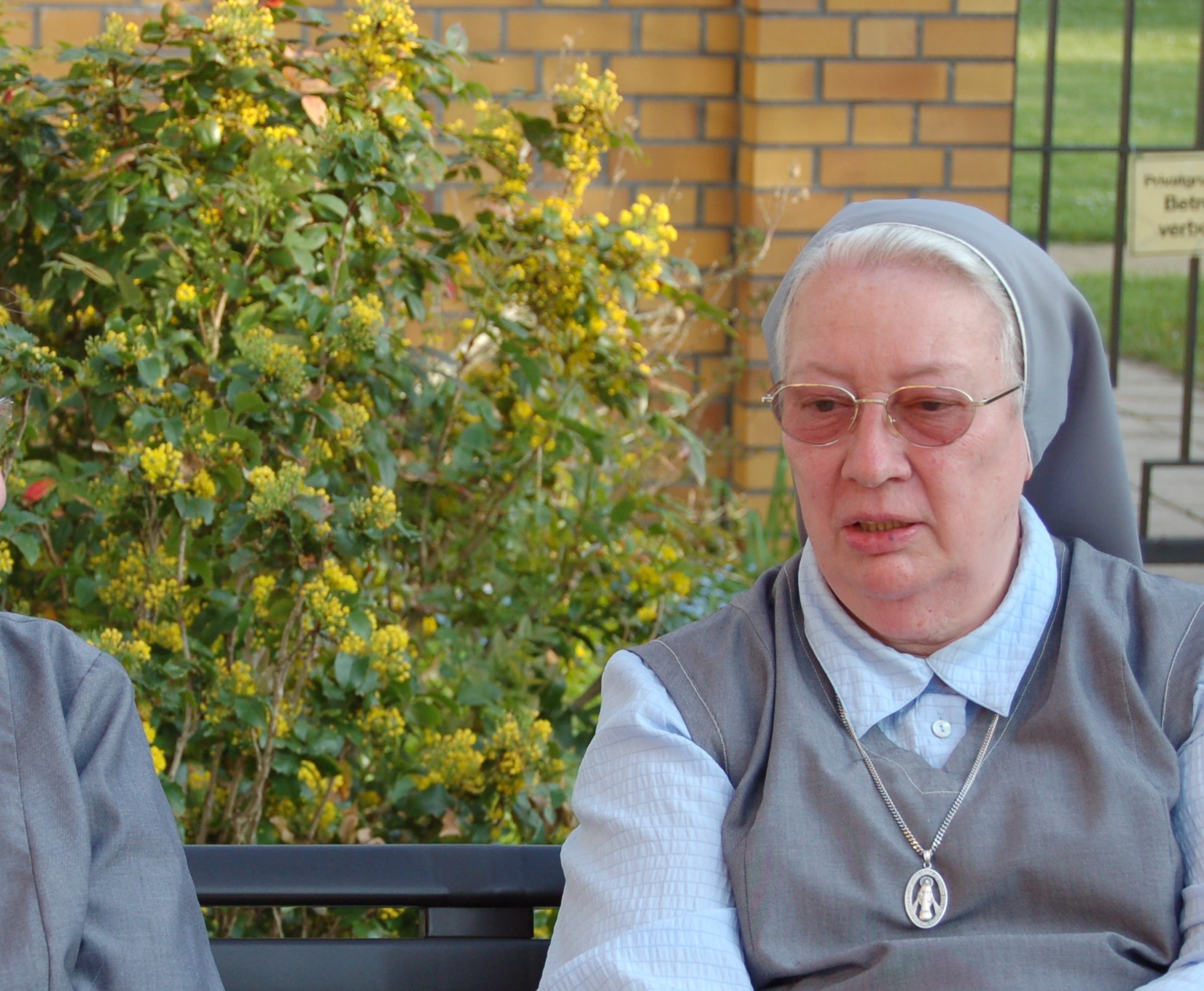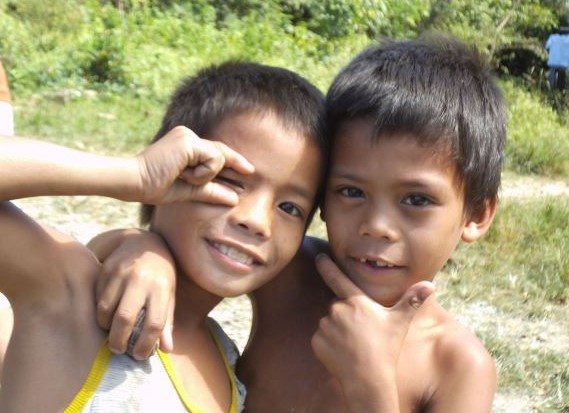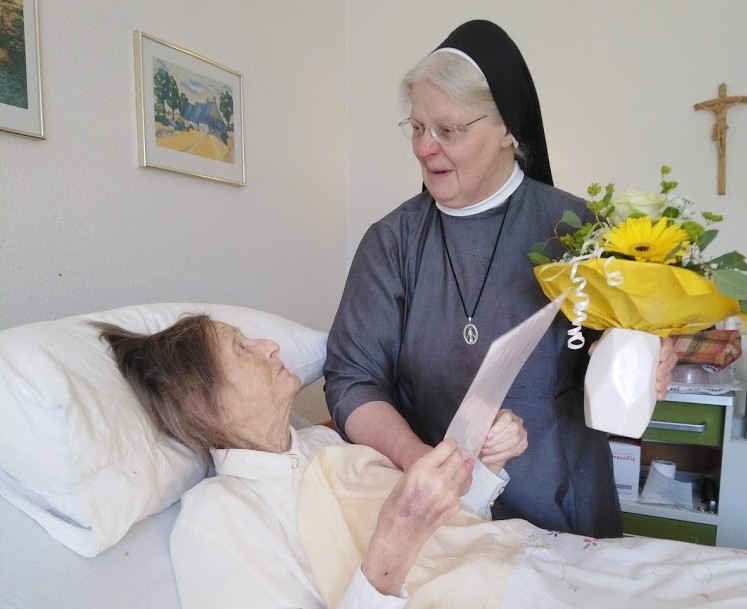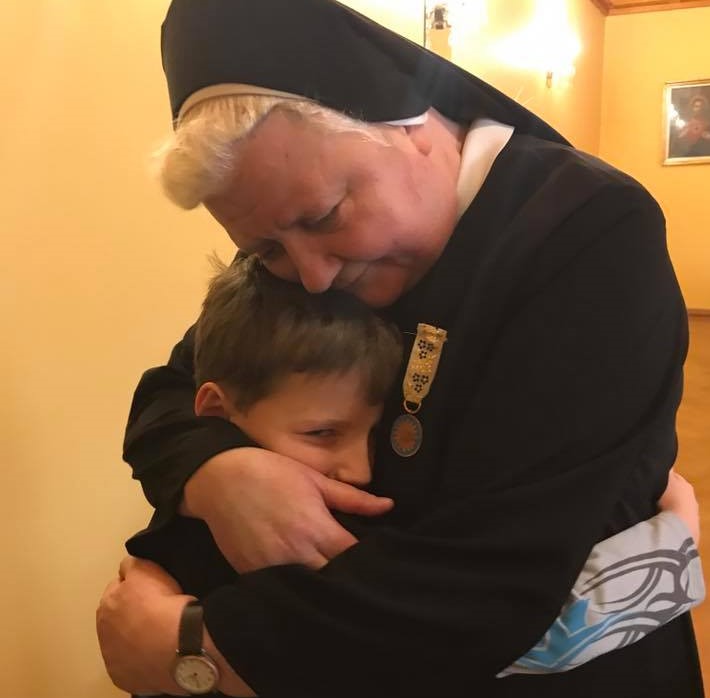
Aug 16, 2020 | HISTORY
Sr. M. Luka Spengler was one of the sisters who witnessed the move of the Generalate to Rome in 1970 and the early days there.
In the following text she tells from her memories:
Our trip to Rome began at the end of July 1970. We, Sr. Genovefa and I, first took the interzonal train from Berlin / West to Frankfurt / Main. We had to change there. Sr. Kuniberta joined us in Frankfurt, who had broken off her vacation to help with this not easy undertaking. We had a lot of luggage and it was not so easy to keep track, not to forget or lose any luggage. It was a long journey to Rome and we were glad when we finally drove into Rome.
We were supposed to be picked up there by sisters from another congregation, but no one was there. We had no choice but to wait, because we neither knew the language nor did we have money. And it was very hot!
After a long wait, the sisters finally came (I don’t remember which community they belonged to) and fortunately they spoke German. They took us to their house and there Mother Gertrud, the General Treasurer Sr. Florina and the General Assistant Sr. Doris, who had arrived by plane, were waiting for us. We stayed with the sisters for one night. The next morning the Vicar General Sr. Maria and Sr. Edda Krüger arrived in Rome by car from Berlin. Together we then drove to La Storta. There we had rented a house on the premises of the Dillinger Franciscan Sisters, which was to become the seat of the general government for two years.
The house we found was completely empty. The furniture transport from Germany was supposed to arrive in the course of the morning, but did not arrive until evening. So we had no choice but to wait in the Roman heat. We didn’t have anything and at least I got a chair from a nearby stable so that Mother Gertrud could sit on it. The rest of us sat on the steps and waited.
When the furniture transport finally came, it was late and we unloaded everything and only set up the beds for Mother Gertrud, Sr. Maria, Sr. Florina and Sr. Doris. The rest of us slept on the mattresses we had put on the floor. We didn’t put all the furniture up until the next day.
Until we (Sr. Genovefa, Sr. Kuniberta and I) took the train back to Germany, we stayed in Rome for about 3 weeks and experienced the early days and initial difficulties first hand. It started with shopping. La Storta is a bit outside of Rome and the nearest shops were far away and there was no bus. Mostly it was Sr. Doris who did the shopping and she was often taken away by Italian soldiers who were probably stationed nearby.
The Dillinger Franciscan Sisters, on whose grounds we now lived, were also very hospitable to us. They did a lot of farming and gave us fresh milk and eggs every morning. We were also able to take part in the Holy Mass there every day.
Language was a big problem in the early days. None of us spoke Italian. There were some misunderstandings, but they often made us laugh. For example, an electrician came into the house. It was hot and he always spoke of caldo, caldo. The nurse would always say, no, it’s hot. But we didn’t know that “caldo” means “hot” in Italian and that we always only understood “cold”.
Looking back, I can say that it was a difficult but also a very nice time and today I am grateful that I was able to help with the beginnings of our Generalate in Rome
Sr. Luka Spengler

Aug 16, 2020 | POSITIVE IMPULSES
We are sources of energy around us Because we are temples of God. So the quality of energy that comes out from us is likely to return in a similar form. It might not be from the same place or the same person but you get back what you give out from somewhere. So if you don’t like what you are getting, check what you are giving. Check your attitude, intentions, and feelings. Now get prepared to change the quality of the energy you give. We can give the energy of God or we can give the energy of our ego. The more you give, the more you get. Whatever it is.
Don Giorgio

Aug 13, 2020 | NEWS
Happy 100th birthday
Here is a small excerpt from the work of our sisters in the St. Hedwig retirement home in Cochem. The convent is small and the sisters are mostly old and partly self in need of care. But they continue to try to help and do the services that they can still do. In addition to their praying presence with and for the residents, contact with the residents, employees and visitors in the house is very important to them.
The superior of the convent, Sister M. Felicitas, regularly visits the residents in the senior citizen center.
This time it was a very special occasion, because Ms. K. was 100 years old and so she brought the congratulations to her.
Ms. K. can no longer get out of bed, but she is very grateful for every visit and is happy about the conversations. Ms. K. is very interested in all the news in the house and in the city of Cochem.
May she continue to trust in God’s help and thus walk the path into eternity.

Aug 10, 2020 | NEWS
Sister Lucy.
I knew she was going; these were the last days of her life. I tried to keep up with her, understand and grasp the essence of dying, going to this prayed and awaited eternal life. The last words of Sister Lucy, whispered over the receiver of her perpetually crashing phone: Henius, dear, thank you for everything, for each of your moment days with me. Forgive me if I offended you even unknowingly, even mentally.
That was Lucy. She never thought about herself. These almost ten years of friendship and working together have been continuous learning for me. Difficult questions and even more difficult answers. My rebellion against social injustice and human meanness collided with Lucy “turn the other cheek.” My anger at the people who dealt more blows with me and the desire to retaliate met her patient “pray for them, ask for the grace to distinguish between good and evil, so that they will stop doing evil. With time, I became a different person with more patients. Before making a criticism, I was asking myself some questions. It’s hurt. When I ask the more questions and I had few answers, it became more hurt. It has been almost nine years since Lucy came to me ashamed, and asked for help. She, Saint Lucy (that’s what people talked about her) stood in front of me in a washed-out habit, mossed on her stomach, in trampled flip-flops, and in her hands a torn old purse – her entire circuit office, with stamps, a notebook, an old cell phone, and tried to explain to me where her poverty and need come from. I looked at this strange figure angrily. I listened to the incoherent story, I arrogant and saucy, furious with everything, having ready solutions and unambiguous answers to every question.
I will not give my sister any money, because I do not have it myself, but I will work until we fix the system, I declared. Back then I didn’t know that to fix the system I would have to fix myself. It was hard. God could not help but notice so many shed tears together with Lucy. His hydrological services must have noted significant high levels, because she probably got pissed off and forgave us these torments with the government. Lucy taught me humility and I taught her courage. Sometimes, during conversations in the government tables, when the atmosphere was reached a boiling point, I surreptitiously kicked Lucy in the ankle to go for prayer. She was standing behind the half-closed door, sniffing at the rosary, counting on God’s help that maybe some miracle would happen. Over time, we became a very strange couple: she was big, stooped, walking with a heavy pace, and I was small, in boots and walking, both grey-haired, walking together like a pair of old horses in harness. Our friends commented on our media that it is scary to open the refrigerator because of fear that may be Lucy will be there. Lucy was afraid of the microphone and the camera. She did not like recordings; she was embarrassed to talk about her work and problems. There was no way out, finally she agreed to these cameras and microphones, because it was necessary to show the social problem, expose the lack of state care for abandoned children with intellectual disabilities, and finally repair this leaky system. She loved journalists, and had a very deep personal and family friendship. There was a place to sleep and a bowl of soup for each of them. They repaid with respect for her privacy and journalistic integrity. Sister Lucy knew everyone. Literally everyone and everywhere. She had a badly worn notebook with telephone numbers. She opened it when she needed it. Not necessarily yours. “Mercy is to be silent,” she would say, shoving a banknote into my hand and showing my grandmother rummaging in a garbage can. Do not say it’s from me; give it discreetly so that no one can see. Or: Henia, look at this poor man who is walking down the street. He was once somebody, he had money in his position, and he was a doctor. Remember about him, he doesn’t drink anymore but sometimes he needs a few (money) zlotys. I worked for a bowl of soup, because working without a reward is a sin – she used to say. I regularly got a hot dinner, a clean napkin and necessarily two lunch portions. Sister, I won’t eat it, I don’t need that much, I protested. Share, see how many poor people are walking on the street – she always had an answer ready. We both knew that the disease was progressing, impotence and unimaginable pain became its inseparable companion, which only leads to one way. Until the end, she handed over a kind of will to me, indicated people, entrusted them to my care, and asked for their memory. Until the end, she also quoted a funny saying: a nun must be a human, otherwise a habit can be hung on a peg, but the peg, because of wearing a habit, will not become a nun.
Henryka Szczepanowska

Aug 8, 2020 | POSITIVE IMPULSES
It’s important to develop certain immunity against others’ opinion about you. You cannot stop people having their opinion. Do not let other’s opinion about you make you feel offended or worried. Find little ways to appreciate yourselves and find happiness in what you are. And don’t lose sight of your objective by the opinion of others. Be happy with the goodness in you and go on developing it.
Don Giorgio





